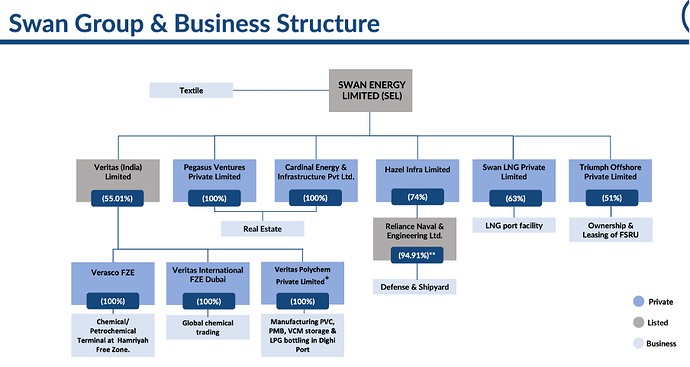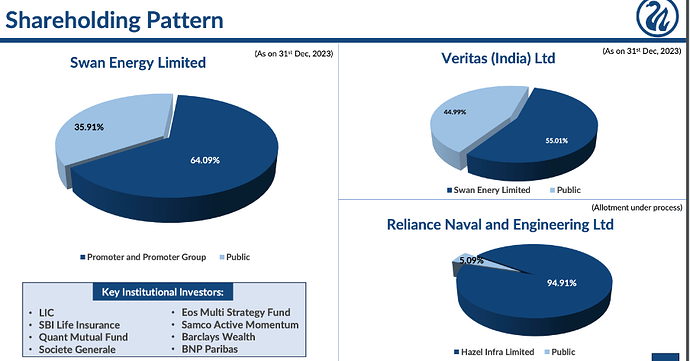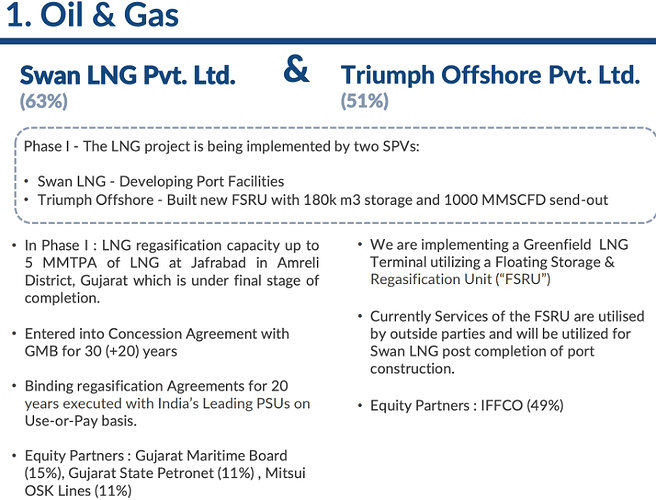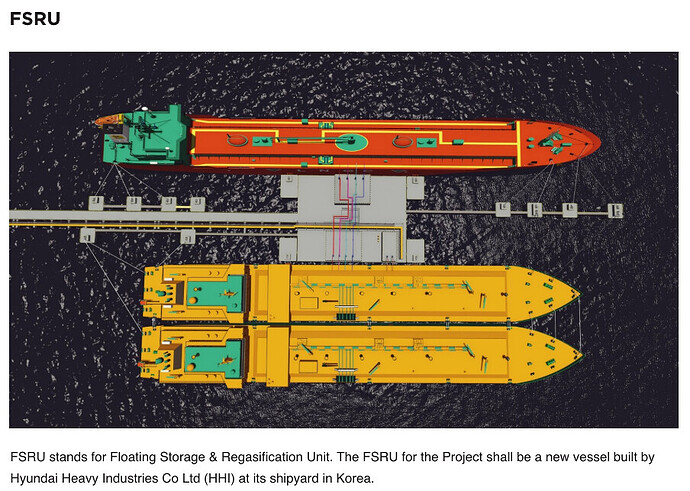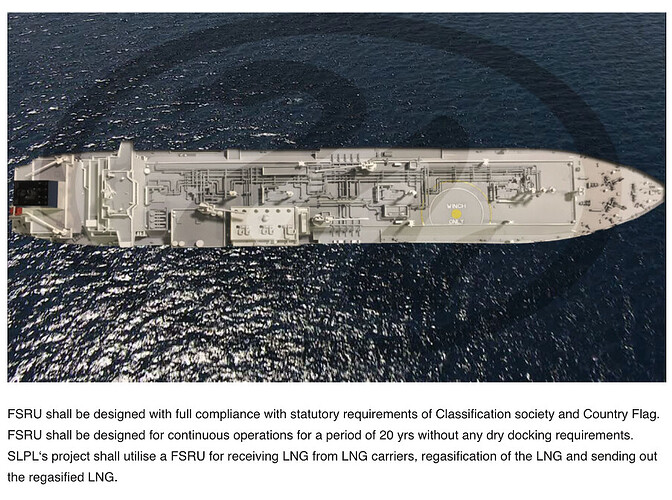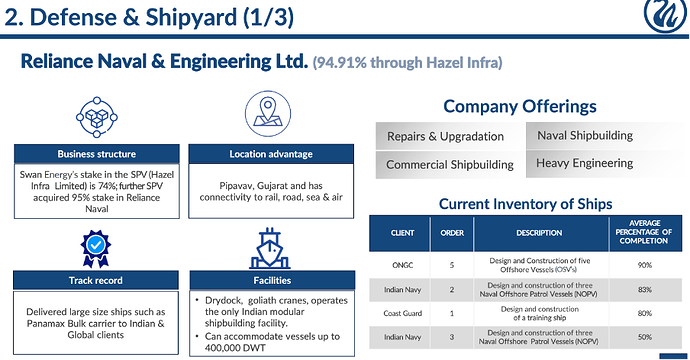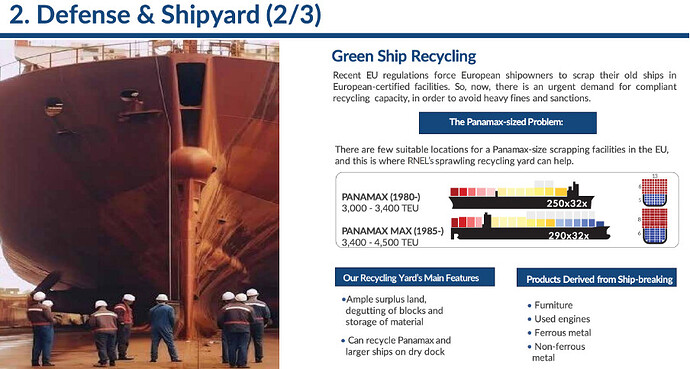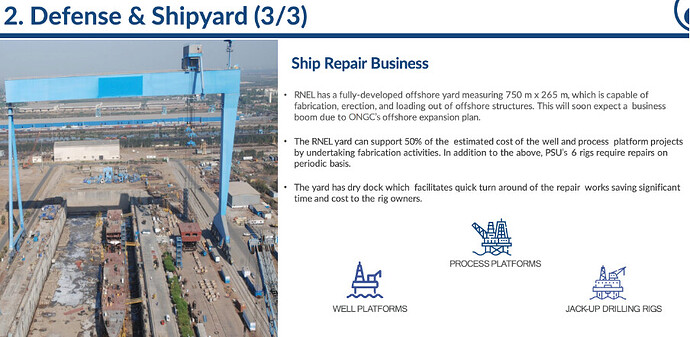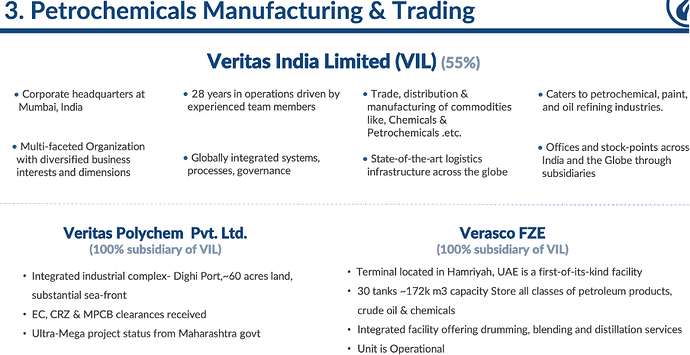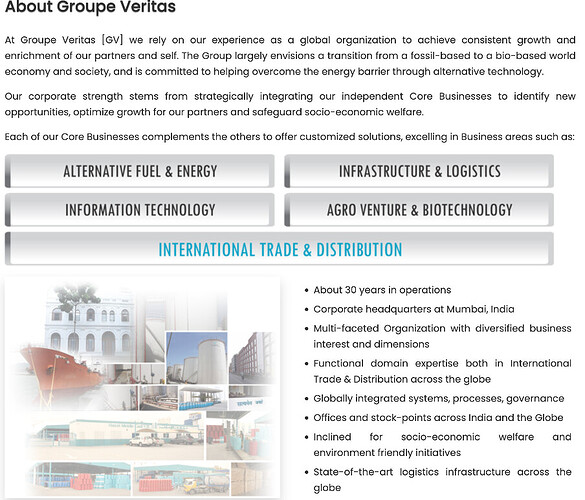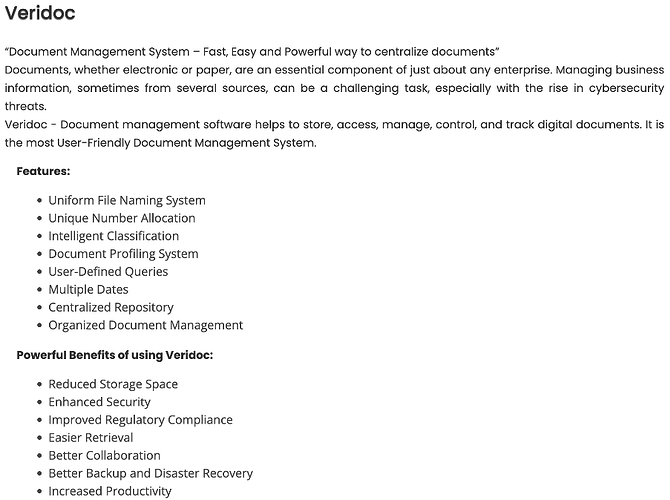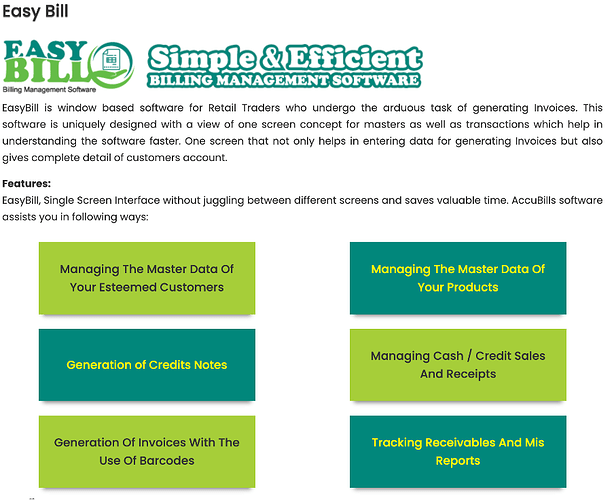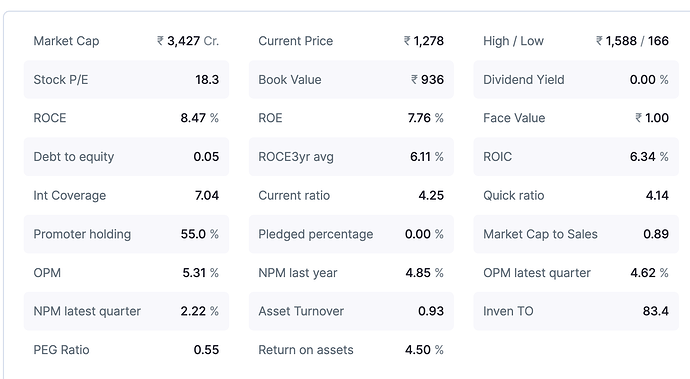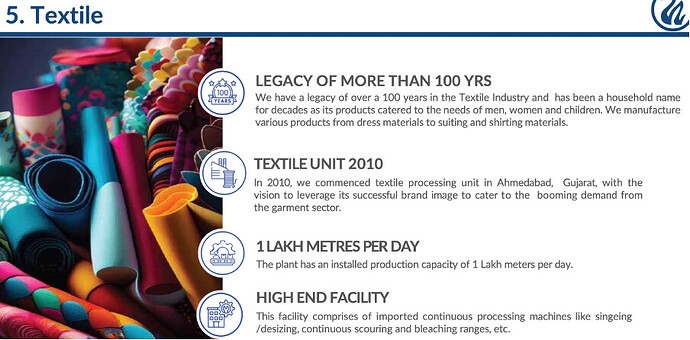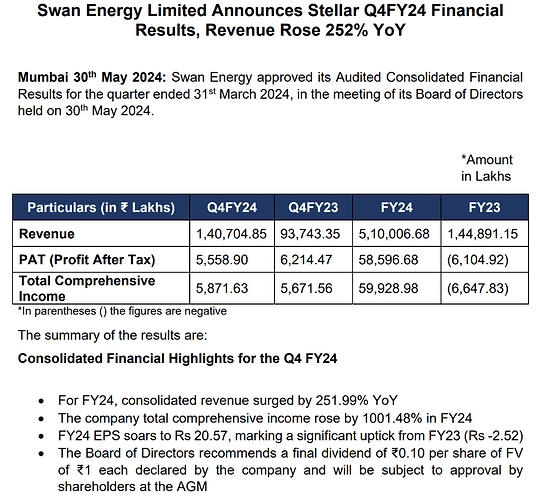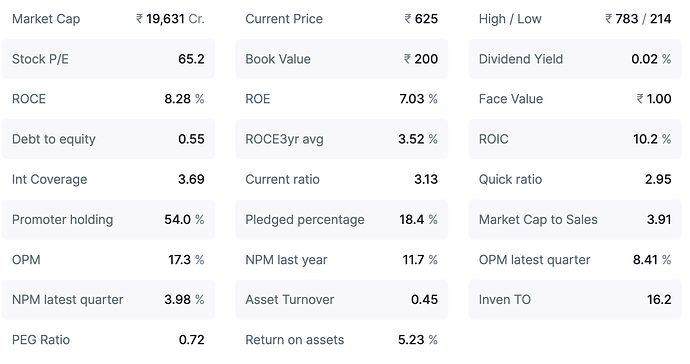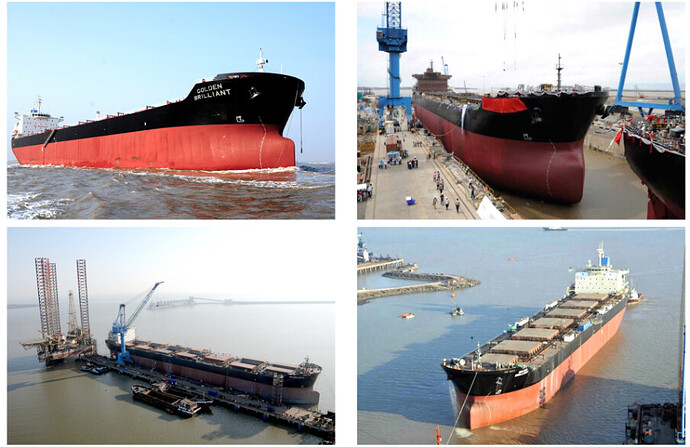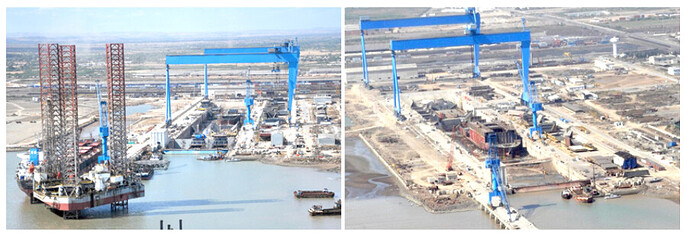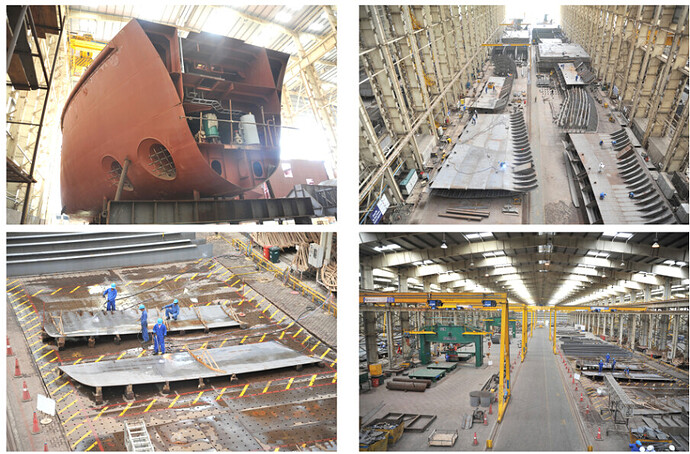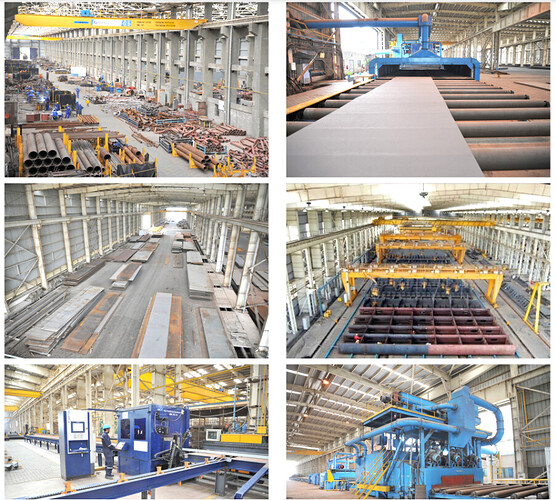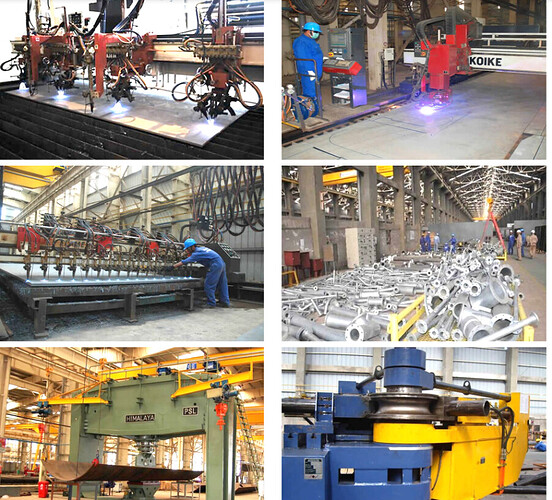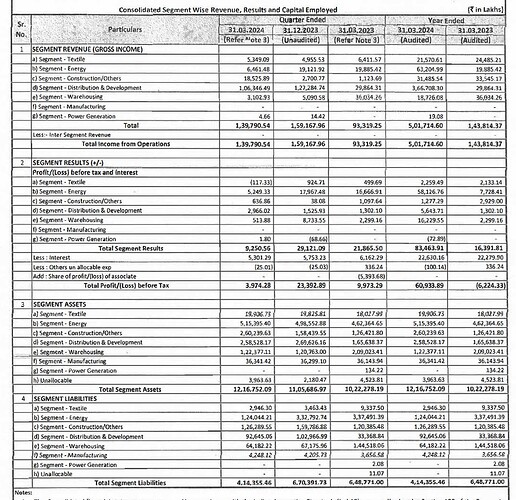Company Overview:
• Incorporated in 1909 as textile company
• Business turnaround & discharged from BIFR in 1995 by present promoters; land monetized for developing real estate projects
• Diversified business interest in Oil & Gas, Real Estate & Textile
• Recently ventured into Defence & Shipyard and Petrochemical Manufacturing & Trading businesses through acquisition of Reliance Naval & Engineering Limited and Veritas India Limited
Shareholding has come down to 54% post QIP
Business Segments:
- Oil & Gas
- Defense & Shipyard
- Petrochemicals Manufacturing & Trading
- Real Estate
- Textile
About Swan LNG Pvt. Ltd.
Natural gas is increasingly emerging as a fuel of choice on account of its clean combustion properties. Natural gas is the third largest energy source after crude oil & coal, and accounts for nearly 24 per cent of global primary consumption. The natural gas market in India is growing at a rapid pace and its share in overall energy basket is increasing. The government is keen on promoting its usage and it is envisaged to increase the share of natural gas in domestic energy basket currently around 6.5% to around 20% by year 2025.
To support the increasing gas demand, LNG imports are required to be increased and the same will result in requirement of LNG receiving and regasification facilities in the country.
In order to tap the country’s increasing gas demand, Swan Energy Limited is implementing a greenfield LNG Port project. The Project comprises of development of LNG Port facilities utilizing a Floating Storage and Regasification Unit (“FSRU”) for LNG receipt, storage, regasification and send-out, with a regasification capacity of 5 MMTPA of LNG, off the Jafrabad coast in Amreli district in Gujarat (“the Project”).
The Project is being implemented through a special purpose Company named Swan LNG Private Ltd. (Swan LNG). SEL is the Lead Promoter of the Company and holds 63% equity of SWAN LNG.
Government of Gujarat entities, viz. Gujarat Maritime Board and Gujarat State Petronet Limited are strategic equity partner in the Project with 15% and 11% equity stake respectively in SWAN LNG. Mitsui O.S.K Line (MOL) holds 11% equity stake in the Company and is also the Technical Partner.
MOL is a leading marine transportation company owning and operating one of the world’s largest merchant fleet. The MOL group owned and operated 883 vessels. The current fleet size includes 91 LNG carriers. Considering the experience and expertise of MOL with fleets of operating FSRU, MOL is the technical cum equity partner for the Project. SWAN LNG is developing the LNG port facilities as the part of Project while the FSRU to be used for the Project shall be owned by SEL or its subsidiary. FSRU to be used for the Project will be hired under a long term Bare Boat Charter (BBC) from the FSRU owning company.
Port Location
The Project is located at Bhankodar Village, Dist. Amreli which is at the mouth of the Gulf of Cambay on the south-west coast of Saurashtra region of Gujarat, inside the Jafrabad Creek, between the Pipavav Port to the east and Jafrabad Port to the west. The nearest big town is Rajula which is 24 km northeast of the LNG Port location.
The location in this port is highly strategic and advantageous owing its proximity to international shipping route from Colombo to Gulf countries. In fact, the distance from the gulf countries to Swan LNG Port is the shortest when compared to all other LNG Terminals in India.
The location of the port is also very significant in terms of its connectivity with primary and secondary hinterland to the northwest of India. Besides its geographical benefits, Swan LNG Port also has connectivity with the national gas grid making it an ideal facilitator of LNG imports.
LNG Terminal Overview
The Project includes setting up of a 5 MMTPA LNG Port for LNG regasification using a FSRU along with a FSU at Jafrabad in Amreli district of Gujarat. The Project capacity can be further ramped up to 10 MMTPA in future. The Project is being developed under a concession from Gujarat Maritime Board (GMB). The Project has already received the Environmental Clearance & CRZ approval from the Ministry of Environment and Forests, Govt. of India.
Key Project Components:
The key Project components are as under:
• Project Land: The Project will be implemented over a 97 Hectares (Ha) land parcel.
• Capital Dredging & Land Reclamation: The harbour area will be dredged to achieve a minimum depth of 14.5 meter. The total dredging volume is estimated to be 8.52 million m3. Dredging contract will also include reclamation of land.
• Breakwater & Shore Protection: Breakwater is required for providing tranquil conditions for berthing and LNG unloading throughout the year. The Breakwater construction includes transportation and installation of rock works, fabrication, transportation and installation of concrete armour made up of Accropode-II, transportation and setting up of M-40 grade concrete for the wave wall
• Jetty & Platform: LNG Jetty will be constructed as part of the Project, capable of handling FSRU on one side and LNGC on the other side
• Onshore Works, Utilities & Facilities: The Onshore facilities include development of green belt, construction of buildings and pipeline corridor till delivery point, installation of metering units, electric system, fencing, fire water storage tanks, amenities etc. Additionally, Utilities includes marine equipment like moorings, fenders, lines, berthing aid systems, etc.
Triumph Offshore Pvt. Ltd.
Floating Storage and Regasification Unit (“FSRU”)
Importance of Natural Gas:
The world today is in a dire need of an alternative fuel source, one that can permanently replace the harmful fossil fuels that a majority of global population is breathing in today owing to the growing number of vehicles on roads. Natural Gas, has come to light as a very ideal source at least until something better is discovered. Natural Gas is important in several ways:
To begin with it produces half as much Carbon Dioxide, as burning fossil fuels like coal. This certainly helps in curbing the global warming problem for a longer time and fosters discovers of cleaner fuel sources.
Another important trait of Natural Gas is that it is that it is more abundant than fossil fuels. Natural Gas reserves are estimated to outlast fossil fuel reserves by several years. Today, Natural Gas is becoming a fast growing fuel, and is perceived to be a game changer in the fuel wars of the world.
What Is LNG?
Liquefied natural gas (LNG) is natural gas (predominantly methane, CH4) that has been converted to liquid form for ease of storage or transport to different destinations. It takes up about 1/600th the volume of natural gas in the gaseous state. It is odourless, colourless, non-toxic and non-corrosive. LNG is only flammable if it evaporates in contact with an ignition source and the amount of gas in the air is between 5 and 15 percent.
If Natural Gas needs to be transport over long distances, LNG is a particularly good alternative to gas transport by shipping as well as by way of pipelines.
Gas Pipeline Infrastructure
India has a relatively underdeveloped gas pipeline infrastructure when compared to some developed countries. However, in tune with increasing demand and growing natural gas supplies, the government is taking steps to build a better infrastructure. India, currently, has a network of 13,000 km of natural gas transmission pipelines with a capacity of around 337 MMSCMD. This network is expected to increase to around 28,000 Kms with a total capacity of around 721 MMSCMD in next decade owing to the formation of a National Gas Grid connecting which will connect all major centres of the country. The western region of India accounts for the highest proportion of the existing pipeline network of the country and also for the highest consumption of natural gas. At the same time the presence of pipeline network remains significantly low in the central, southern and eastern parts of the country. To address the regional imbalance of pipeline networks present in the country, MoPNG in the year 2007 authorized to lay around 8400 Kms of pipeline network. India is expected to have circa 32,727 Kms of natural gas pipeline with a design capacity of 815 MMSCMD in place by 2030.
LNG & India
India is a country that has primarily relied on fossil fuels like coal, especially to power its power sector. Liquid fuels, above all diesel is the lifeline of our road transport. It is the call of the hour for India to look for better fuels that are more clean and efficient than fossil fuels. But for environmental reasons we need to focus on cleaner fuels.
The development of Natural Gas industry in the country started in 1960s with discovery of gas fields in Assam and Gujarat. After discovery of South Basin fields by ONGC in 1970s, Natural Gas assumed importance. The Exploration activities in India were earlier carried out only by the National Oil Companies (ONGC & OIL). It was not until later that private companies joined this regime and subsequently 100% foreign participation in exploration was allowed. More discoveries were made in the Natural Gas segment in the coming years and in 2004, liquefied Natural Gas was imported from Qatar and LNG terminal was set up at Dahej of 5 MMTPA capacity.
Currently, India has a gas pipeline network length of 14,987 Km having capacity of 401 MMSCMD spread over 15 States (including Union Territories). The current demand of Natural Gas also far exceeds its supply and to cater to such demands, R-LNG is being imported. The CGD (City Gas Distribution Center) sector comprises of Compressed Natural Gas (CNG) and Piped Natural Gas (PNG) customers. Today, there are over 936 compressed natural gas (CNG) stations across the country and 24, 14,288 households with Piped Natural Gas (PNG) connectivity. The consumption of gas in the CGD network is estimated to be over 16 MMSCMD, that is spread between various distribution channels of domestic and industrial sectors.
The Government on the other hand, is constantly implementing policies and guidelines that facilitate better distribution, consumption and fair pricing of Gas for all sectors. The Government is also facilitating several projects that ensure smooth import of Natural Gas from different parts of the world.
Veritas (India) Limited:
VIL was incorporated on 21st March 1985 and is listed on the Bombay Stock Exchange. The company has expanded globally reducing its dependence on a particular region. The company has established overseas subsidiaries and offices.
Business Verticals:
Trading
Group Veritas has emerged as a pioneer in shaping the global trading market, with a track record of performance, customer care and sustained growth. With access to Technical, Managerial and Financial resources, it is uniquely equipped to provide an unmatched range of services, customer care and complete payment security for its customers at the most competitive rates.
Logistics
With the advent of the global economy growing at a pace faster than it has done for decades and the pace of reforms in our very own country, which is among the fastest emerging economies in the world, infrastructure growth is an area which needs to be given extremely high relevance.
With the growth of the company, the freight management and transportation of goods become vast and more complex. A good logistics company can help better logistics management and can play a major role in the company’s success and operations.
An all-service logistics management company provides end-to-end supply chain solutions with the best logistics services at the most competitive pricing.
Power Generation
Veritas India Ltd is the leader in sustainable energy solutions. We generate power by exploiting wind resources and delivering best-in-class wind power solutions. Electric energy is generated by converting wind energy into the rotating energy of the blades and converting that rotating energy into electrical energy by the generator.
I T & SOFTWARE PRODUCTS
Swan Mills
Swan Energy Limited (formerly Swan Mills Limited) is an established name in the textile business, enjoying a long-term reputation in the domestic and international textile markets.
Over the years, the unit has expanded, with the most recent expansion taking place in 2021, increasing the plant’s capacity to 3 million metres a month.
====================================================
Qualified Institutional Placement:
Swan Energy Limited Successfully Raises Rs. 3,000 Crore via QIP
Mumbai, 29th February, 2024:
Swan Energy Limited (SEL), a prominent global conglomerate with diversified interests in Real Estate, Textiles, Oil & Gas, Defence and Commercial Shipbuilding and Ship Repairs, and Heavy Fabrication, has successfully raised Rs. 3,000 crore through a Qualified Institutions Placement (QIP). The QIP was priced at Rs. 670 per share, inclusive of a premium of Rs. 669 per share.
The QIP garnered significant interest from qualified institutional investors, including Quant Mutual Fund, SBI Life, LIC, LIC Mutual Fund, Tata Mutual Fund, Infini Mutual Funds, SBI General Insurance, BNP Paribas Mutual Fund, Nomura, Diamond Asia, Bank of India Mutual Fund, ITI Mutual Fund, Goldman Sachs, Future Generali, Anand Rathi, and other domestic and foreign institutions and family offices.
The funds raised through the QIP will be strategically deployed towards the modernization of the recently acquired erstwhile Reliance Naval and Engineering Ltd (RNEL) shipyard at Pipavav. Additionally, a portion of the funds will be allocated for project expansion and debt reduction.
Paresh Merchant, Executive Director of Swan Energy Limited, expressed optimism about the company’s future trajectory, stating, “We are delighted by the enthusiastic response from both domestic and foreign institutional investors. Taking management control of RNEL, the largest shipyard in India, aligns with our vision to emerge as a leading private player in the manufacture of defence, commercial, and oil and gas vessels.
Our goal is to establish ourselves as the foremost player in ship repairing and a hub for global manufacturing in the Asia Pacific region. To achieve these objectives, we are undertaking a comprehensive restructuring initiative to ensure a seamless transition towards resuming yard operations in the near future. We remain committed to fostering a strong people culture and creating value for our stakeholders, investors, and employees.”
Swan Energy Limited has intensified its shipyard restoration efforts, focusing on activities such as dredging, reinstatement of licenses and certifications, implementation of industry-standard safety measures, and upgrading basic utilities. The company has engaged a renowned global consulting firm and recruited top industry talent to expedite the turnaround of the facility, aiming to commence commercial operations by June 2024.
A dedicated arm of the Swan Group is overseeing procurement and supply chain management to meet the demands of downstream activities. SEL is also dedicated to mobilizing human resources, with plans to upskill and absorb employees through an internal selection process, while ensuring full compliance with statutory requirements.
================================================================
Mr. Chetan Selarka, CFO, Swan Energy Limited said, ‘‘FY24 has been a year of developing a robust foundation of growth across all business verticals. Following a successful fund raising through QIP, we have made substantial progress in debt reduction in the company including subsidiaries. We have formally taken the management control of RNEL from NCLT and the issuances of shares are in process. We have initiated the process of revamping of the RNEL shipyard infrastructure facilities to make it operational as well as building a proficient leadership team. These measures, aimed at fortifying our organisational strength, are in line with our mission to strengthen the shipyard manufacturing capacity to take India amongst the top five countries in heavy fabrication, ship building and ship repairing across the commercial and in naval sectors.
Veritas (India) business has been fully integrated into our results.
The real estate segment is displaying growth momentum, as it has recently obtained an occupation certificate for a premium residential project in Bengaluru.
Additionally, we are also aggressively working on completion of LNG terminal project.
======================================================
14/06/2024
Incorporation of a wholly owned subsidiary:
Swan ImagAInation Private Limited
Board of Directors of the Company at their meeting held today i.e. June 14, 2024, have approved, a proposal to incorporate a wholly owned subsidiary to inter alia engage in Information Technology and Artificial Intelligence activities.
The object of the incorporation is to engage in survey & imaging services related activities using the latest technology including but not limited to:
Remote sensing,
GIS,
LIDAR,
Laser Scanning and
Drone Photogrammetry.
What lies ahead for the next few yrs:
(Online Digging)
The company focussing on sectors with strong tailwinds:
- Defence - Majority stake holder in erstwhile Reliance Naval-expected to get listed soon.
The capacity of Reliance Naval is equal that of combined capacity of Mazagaon (market cap 80,000 crore) + Garden Reach ( 20,000 crore) + Cochin Shipyard ( 59,000 crore)
At present already 11 ships under construction at Reliance Naval.
Swan Energy has bagged this asset at throwaway price of ~ Rs.2200 crore from NCLT and that too payable over next 5 years. - Real estate in prime area of Khar - Bandra- Developing 2m sq. feet x Rs.60,000 per square feet = Rs.12,000 cr of real estate potential
- New Energy - LNG terminal being set up on mega scale in Gujarat.
- Veritas - Subsidiary of Swan where they will be manufacturing PVC and doing LPG bottling, Expected ADD coming on PVC. Existing business of chemical distillation and warehousing expected to more than double as they have acquired adjoining land bank in FTZ.
Gas pipeline coming there too. - Geospatial- Incorporation of Swan ImagAInation Private Limited
Entire Swan Energy is available at Rs. 20k cr Market cap
======================================================
Threats, Risks, and Concerns:
Energy:
The volatility of oil prices due to international tensions, terrorism, and inadequate domestic supply is a major threat to the sector. The unpredictable geopolitical situation pose a major risk to this industry as the projects, investments, ROI assumptions are disturbed. India has a low domestic energy production and a high level of energy loss in T&D and reliance on imported fossil fuels are concerns for the sector.
Textile:
The textile sector is the 2nd largest industry in India but it also has its own share of threats and concerns. Over-dependency on manual efforts is a major concern for the textile industry. The fast changing fashion is a big challenge for the sector as it increases waste. This industry is infamous for its high pollution rates and catering to the ever-changing trends and fashion is risky. The unavailability of raw materials and infrastructure bottleneck is an incomprehensible threat to the textile industry.
Real estate:
Real estate provides opportunities to 100 allied businesses, similarly the allied industries pose a threat to the real estate industry major factor being, the unavailability of timely raw materials. The volatile material cost leads to variations in project cost. With regard to the war tensions worldwide, there is regulatory uncertainty. The supply chain is disrupted, and heavy competition are a few pain points faced by the real estate industry.
Petrochemical:
The volatility of crude oil prices is a major threat to the petrochemical manufacturing and trading industry of the company, leading to constant erosion in margins. The shortfall in petrochemical intermediate capacity is another point of concern and threat for the petrochemical manufacturing and trading industry.
Political:
Most important in my view.
Managing Director of Swan Energy, Mr Nikhil Merchant’s proximity to PM Narendra Modi is said to be an open secret in the upper echelons of BJP. Some say he’s the next Adani, & he is expanding his business empire in Govt regulated industries, just like Mr. Adani
Controversies:
In 2009, the Narendra Modi led Gujarat Govt. transferred 49% stake in its Pipavav Power Co. to Swan for a mere ₹381 Cr without competitive bidding (Congress said it had assets of ₹14,296 Cr)
Large PSUs such as ONCG, HPCL & IOC + two Gujarat based PSUs have backed Swan Energy’s LNG Terminal by picking up stake in it, & advance booking 60% capacity of the terminal
Swan has managed to secure a slew of working capital loans from many PSU Banks in the past despite not having strong financials.
This is all hearsay and there is no substantial proof.
The political connections are double edged swords, they work in company’s favour and can go heavily against it.
Disclosure: Taken a Tracking Position, Still studying. No recommendation to buy or sell
Compiled notes from here and there

